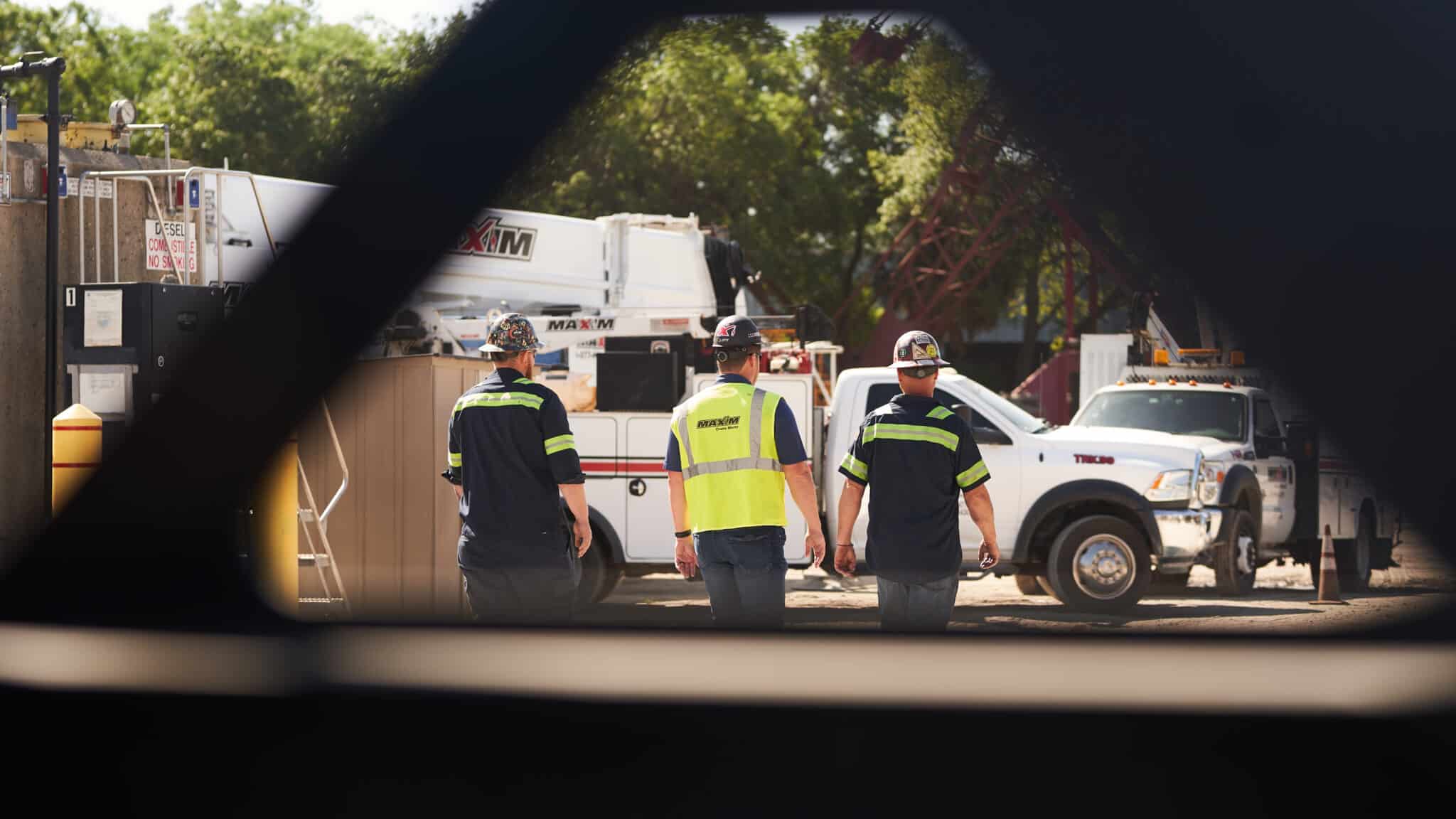Crane rental can seem challenging— what are the different kinds of cranes? How do you know which type is best suited for your project? How do you ensure you meet all safety requirements? You may have many questions about how exactly to rent a crane and how to find the right one to meet your needs.
This article will walk you through 10 of the most asked questions about renting a crane. The answers to these questions should give you confidence in finding the right crane and rental agreement when the time comes to talk to a dealer.
1. What Is Crane Rental, and Why Should I Consider It?
In many ways, crane rental is similar to renting a car. You decide what type of crane you need to accomplish your project and find a rental company with that type of crane.. Once located, you enter into a rental agreement for a specified period. During this time, the rental company maintains ownership, but you are responsible for the crane and its activities. When you are finished using the crane, you simply return it to the dealer.
Renting a crane is a good option for small construction companies that cannot afford to purchase one and do not need the services a crane can provide full-time. Crane rental allows you to use a crane without having to come up with a large amount of money required to purchase and maintain one.
2. How Do I Go About Renting a Crane and What Should I Expect During the Process?
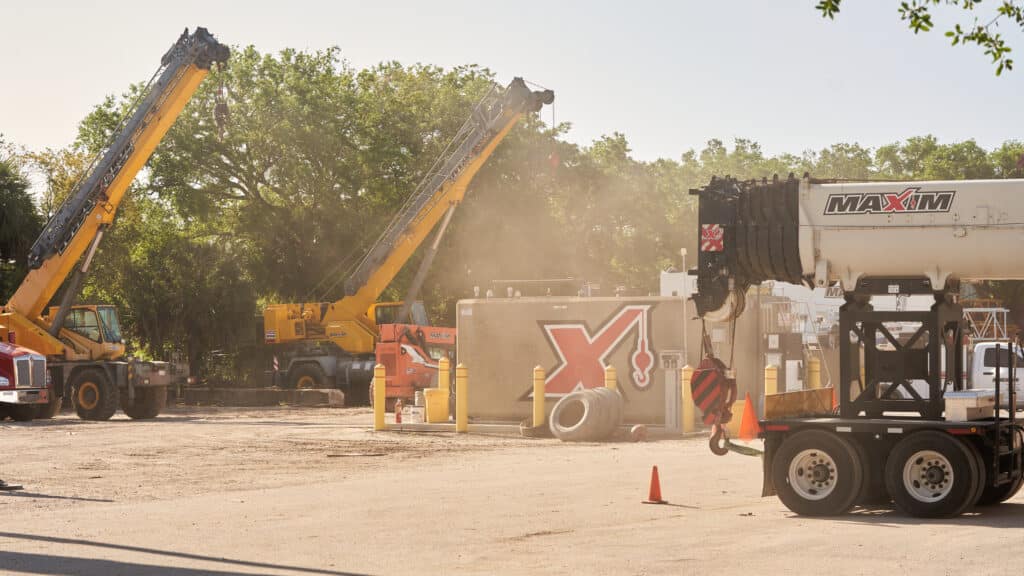
The first step in renting a crane is finding a reputable rental company. Many fly-by-night companies and individuals may offer you better prices on a crane rental, but you may not have the benefit of a well-maintained vehicle with ample insurance and a dedicated team to support you. It is better to go through a company with a history and reputation of providing high-quality cranes and fair rental agreements.
You should inspect the vehicle and look for any obvious problems, like leaking fluids or welded patches on the body. Once you have done all of that, read through the rental agreement carefully. Be sure that your rights and responsibilities are clearly documented, as are those of the rental company. If it all checks out, sign the contract and get to work with your rented crane.
3. How Much Does Crane Rental Cost and What Factors Influence the Price?
Cranes are a vital piece of equipment on many construction sites. They can be used for a variety of tasks, including lifting heavy materials, moving equipment and clearing debris. As a result, they can save a lot of time and labor costs.
The price to rent a crane varies depending on the type of crane, the rental company and the length of the rental period. The price will also be affected by the location of the construction site and whether or not an operator is required.
Generally, you should expect to pay between $200 and $1000 daily to rent the most commonly used types of cranes. Larger tower cranes may run as high as $15,000 a month and are rarely rented for shorter terms.
When considering the cost of renting a crane, it is important to determine how long the project will take and what type of crane is best suited for the task.
Crane supply and demand is another factor to consider. If you live in an area where construction jobs are plentiful and many people are looking to rent cranes, you will pay more to get one if there’s less supply to choose from. However, bigger demand often means increased supply, and you may get lower competitive rates. If, on the other hand, construction jobs in your area are few and far between, your rental costs will be lower — unless there are no cranes nearby, then prices may be higher. It all depends on availability.
By taking all of these factors into account, you can ensure that you get the best possible value for your money. Several factors influence the cost of renting a crane.
4. What Is the Difference Between Bare Rental and Operated & Maintained Rental?
When you’re considering renting a crane, you have two main options: bare rental and operated & maintained (O&M) rental. Here’s a breakdown of the key differences between these two types of rentals:
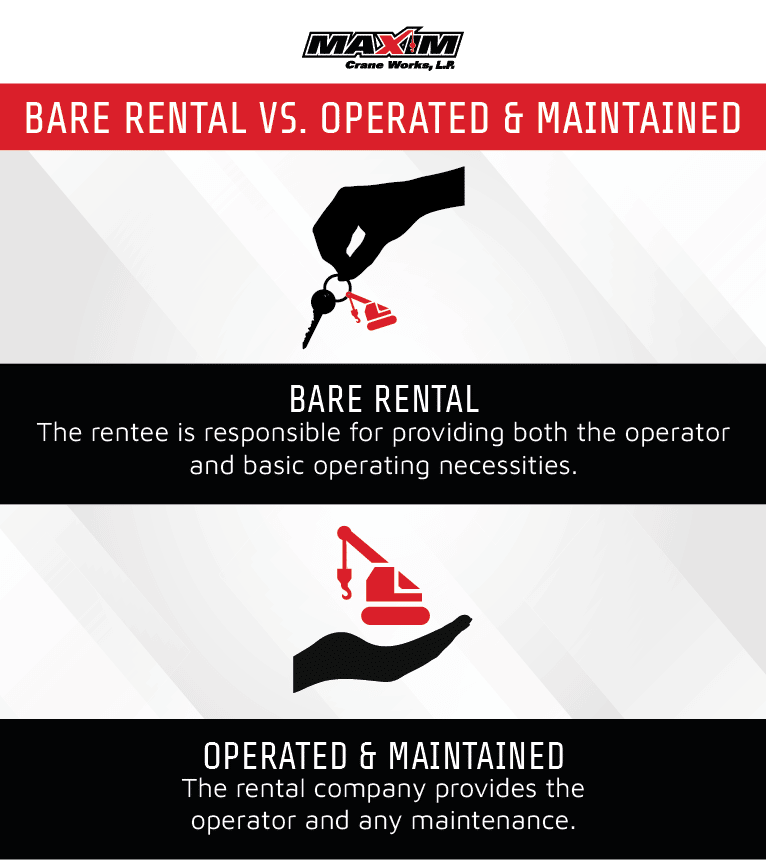
Bare rental is just that – you’re renting the bare crane, without any operators or maintenance personnel. This option is typically cheaper, but it also means that you’re responsible for providing the operator and operating the crane and maintaining it in good working order. If something goes wrong with the crane, you’ll be on the hook for repairs.
An operated & maintained rental, on the other hand, includes operators and maintenance personnel in the price of the rental. This option is typically more expensive, but it can give you peace of mind knowing that there are professionals on hand to operate and maintain the crane. If something does go wrong with the crane, the rental company will be responsible for repairing it.
5. What Are the Requirements for Renting a Crane?
During the rental process, you will be asked to provide proof that you have someone certified to operate the crane. Most states have specific requirements for obtaining this license, so be sure to check with your local authorities. If you do not have a crane operator certified by OSHA to operate the type of crane you are renting, the rental company may have operators you can hire for the duration of the rental.
You may also have to provide proof that you have the appropriate permits and legal documents to do the work you need the crane for.
In addition, you’ll need to have insurance that covers the use of the crane. This will protect you in case of any accidents or damage that may occur while the crane is in use.
You may also be required to prove that you can cover the rental costs. This may entail a credit check.
Be sure that the company you’re renting the crane from is reputable and has a good safety record. During the process they’ll be able to answer any questions you have about the requirements needed. By following these simple steps, you can ensure that your construction project goes smoothly and safely.
6. Are There Any Restrictions on Where I Can Use a Rented Crane?
When renting a crane, you may be wondering if there are any restrictions on where you can use the equipment. In most cases, the answer is no – as long as you have the necessary permits in place, you can use your rented crane anywhere within the city limits. Of course, there are always exceptions to this rule. For example, if you’re planning on using your crane in a crowded area or near power lines, you’ll need to get special permission from the city first. Additionally, some cranes are not designed for use on soft surfaces like sand or gravel, so you’ll need to take that into consideration when choosing a location for your project.
There are plenty of local, state, and federal restrictions on where you can use a crane, but none of them are directly linked to the crane being a rental. Before starting any project, you need to take the time to familiarize yourself with the regulations and laws affecting the area the project is located in. This includes any that pertain to the use of cranes. As long as you do your research ahead of time and get the necessary approvals, there shouldn’t be any problem using a rented crane wherever you need it.
7. What Safety Considerations and Precautions Should Be Considered When Renting a Crane?
Before renting a crane, take the time to consider the safety of your crew and the surrounding community. Here are just some of the main considerations and safety precautions to keep in mind (please note that this isn’t a comprehensive list):
- Make sure the crane is properly inspected and certified by a qualified person
- The operator of the crane should be properly trained and licensed.
- All workers in the vicinity of the crane should be wearing appropriate personal protective equipment.
- The area around the crane should be clear of obstacles and hazards.
- Before a project begins, check the terrain to make sure that a crane could safely navigate it.
- Check to see what underground utilities are in the area. These may be damaged by the weight of the crane or its activities.
- Look for overhead wires in the areas where the crane will be operating.
By taking these precautions, you can help to ensure a safe working environment for everyone involved.
8. What Types of Cranes Are There?
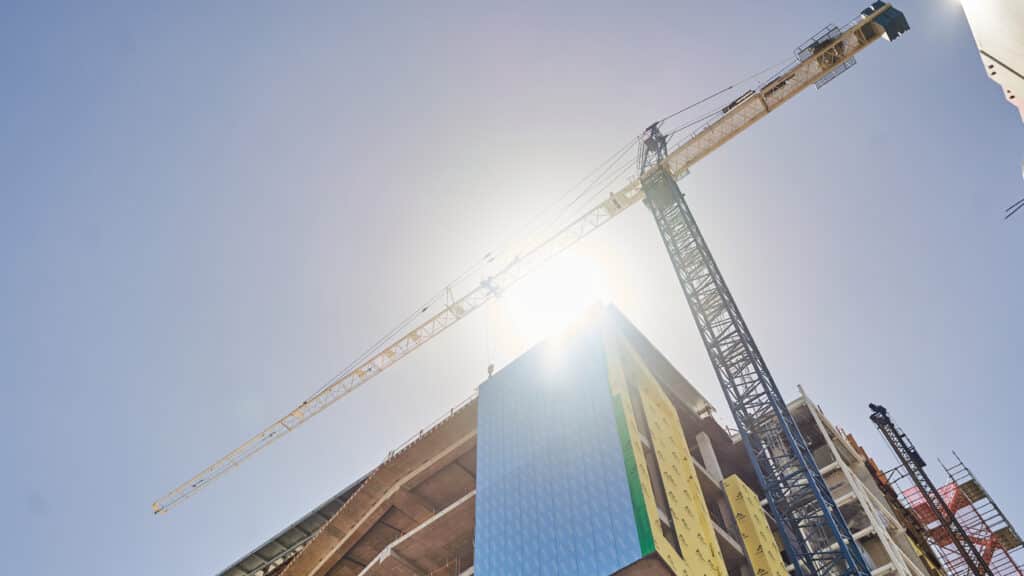
In a nutshell there are three basic types of cranes:
- Mobile: Can be moved from spot to spot
- Fixed: Are anchored to the project they are being used on
- Specialty: Designed for specific situations, like floating cranes on boats
Mobile cranes are the most commonly rented of these three types. There are several types of mobile cranes. These include:
- Truck Mounted Cranes: These are usually limited in how much weight they can carry but have the advantage of being able to travel over the road to get to the worksite.
- All-Terrain Cranes: These can be capable of higher lift loads. They have wheels and can travel over the road and on most worksites.
- Crawler Cranes: These are fitted with tracks instead of wheels and can be used even in muddy or very rough terrain. They cannot be driven over the road; they must be hauled to the worksite.
- Carry Deck Cranes: These are small and have limited lifting capacity, but they are versatile, can squeeze into small spaces, and can maneuver in tight worksites.
9. How Do I Choose the Right Crane for My Needs?
There are several important factors to consider and questions to ask yourself when renting a crane. Here are a few to start with:
Weight
If you are considering renting a crane, the first question you need to answer is: How much weight does the crane have to be able to lift? Renting a crane that lifts more than you need is a waste of money. Renting a crane that cannot handle the workload you need may result in costly delays, machine breakdowns, or injuries.
Terrain
The next thing to consider when thinking about a crane rental is the terrain the crane will have to work through. Many worksites have rough ground and become slippery and muddy after rains. If this is the case with your worksite, be sure to find a crane that can traverse it safely.
Size
Finally, there is the size of the crane to consider. Generally speaking, you want to use the smallest size available to handle the workload you need. The smaller the crane, the lower the price, and the more likely the crane you rent will be able to maneuver around your worksite.
10. What Are Common Myths About Crane Rentals That People Often Believe and Why Are They Wrong?
- Renting a crane is not cost-effective: If you need the services of a crane for only part of the time you are on the worksite, then a crane rental may be much less expensive than owning one. With a rental, you do not need to worry about the cost of maintenance, insurance, or storage of the crane when it is not in use.
- Rental cranes are unsafe: While it may be true that unscrupulous people may rent you a crane in disrepair, respected rental companies won’t. They know that if they get a reputation for renting faulty equipment, they will not stay in business for very long.
- Once you rent a crane, you are on your own: Most rental companies offer many services after you rent the crane. These may include operator services, scheduled maintenance, and service call. In some cases, they will even provide the fuel for your rental crane.
Begin Your Crane Rental Journey with Maxim Crane Works
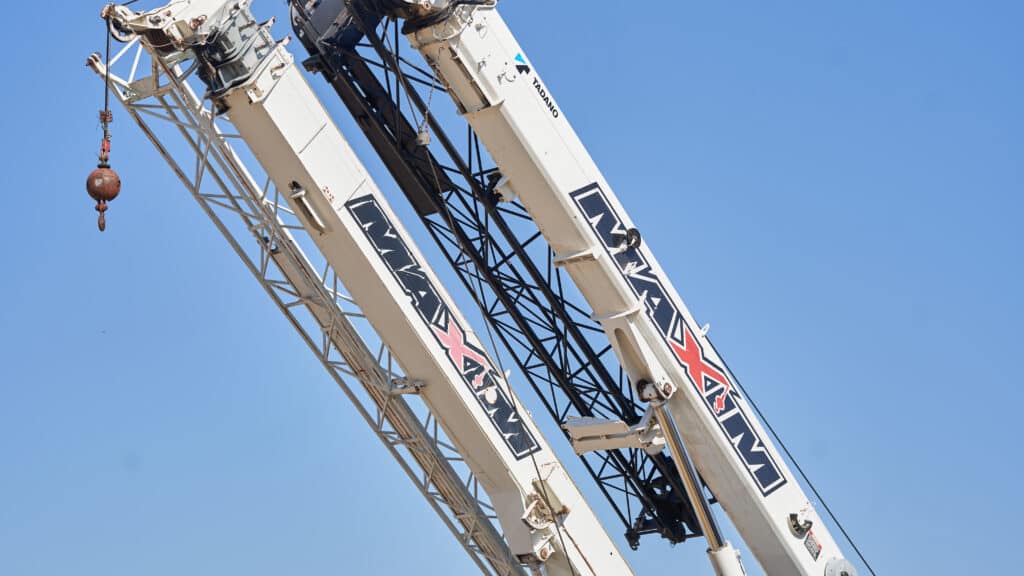
If you are ready to tackle renting a crane, reach out to Maxim Crane Works. Maxim Crane Works is one of the leading providers of crane rentals in the United States. In addition to crane rentals, Maxim Crane Works also provides crane operator training and certification, rigging and transport services, and crane safety inspections.
No matter what your project entails, Maxim Crane Works can help you get the job done safely and efficiently. So, if you’re ready to tackle renting a crane, reach out to Maxim Crane Works today. You won’t be disappointed. With a large variety of cranes for rent and friendly and helpful staff, you’re sure to get the right crane to meet your needs.


